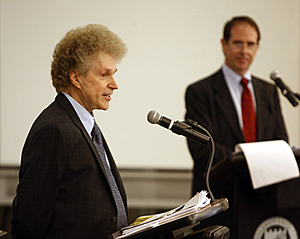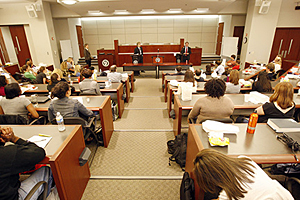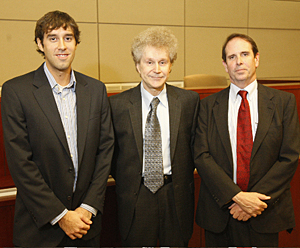
ADVERTISEMENT
- Rozovsky wins prestigious NSF Early Career Award
- UD students meet alumni, experience 'closing bell' at NYSE
- Newark Police seek assistance in identifying suspects in robbery
- Rivlin says bipartisan budget action, stronger budget rules key to reversing debt
- Stink bugs shouldn't pose problem until late summer
- Gao to honor Placido Domingo in Washington performance
- Adopt-A-Highway project keeps Lewes road clean
- WVUD's Radiothon fundraiser runs April 1-10
- W.D. Snodgrass Symposium to honor Pulitzer winner
- New guide helps cancer patients manage symptoms
- UD in the News, March 25, 2011
- For the Record, March 25, 2011
- Public opinion expert discusses world views of U.S. in Global Agenda series
- Congressional delegation, dean laud Center for Community Research and Service program
- Center for Political Communication sets symposium on politics, entertainment
- Students work to raise funds, awareness of domestic violence
- Equestrian team wins regional championship in Western riding
- Markell, Harker stress importance of agriculture to Delaware's economy
- Carol A. Ammon MBA Case Competition winners announced
- Prof presents blood-clotting studies at Gordon Research Conference
- Sexual Assault Awareness Month events, programs announced
- Stay connected with Sea Grant, CEOE e-newsletter
- A message to UD regarding the tragedy in Japan
- More News >>
- March 31-May 14: REP stages Neil Simon's 'The Good Doctor'
- April 2: Newark plans annual 'wine and dine'
- April 5: Expert perspective on U.S. health care
- April 5: Comedian Ace Guillen to visit Scrounge
- April 6, May 4: School of Nursing sponsors research lecture series
- April 6-May 4: Confucius Institute presents Chinese Film Series on Wednesdays
- April 6: IPCC's Pachauri to discuss sustainable development in DENIN Dialogue Series
- April 7: 'WVUDstock' radiothon concert announced
- April 8: English Language Institute presents 'Arts in Translation'
- April 9: Green and Healthy Living Expo planned at The Bob
- April 9: Center for Political Communication to host Onion editor
- April 10: Alumni Easter Egg-stravaganza planned
- April 11: CDS session to focus on visual assistive technologies
- April 12: T.J. Stiles to speak at UDLA annual dinner
- April 15, 16: Annual UD push lawnmower tune-up scheduled
- April 15, 16: Master Players series presents iMusic 4, China Magpie
- April 15, 16: Delaware Symphony, UD chorus to perform Mahler work
- April 18: Former NFL Coach Bill Cowher featured in UD Speaks
- April 21-24: Sesame Street Live brings Elmo and friends to The Bob
- April 30: Save the date for Ag Day 2011 at UD
- April 30: Symposium to consider 'Frontiers at the Chemistry-Biology Interface'
- April 30-May 1: Relay for Life set at Delaware Field House
- May 4: Delaware Membrane Protein Symposium announced
- May 5: Northwestern University's Leon Keer to deliver Kerr lecture
- May 7: Women's volleyball team to host second annual Spring Fling
- Through May 3: SPPA announces speakers for 10th annual lecture series
- Through May 4: Global Agenda sees U.S. through others' eyes; World Bank president to speak
- Through May 4: 'Research on Race, Ethnicity, Culture' topic of series
- Through May 9: Black American Studies announces lecture series
- Through May 11: 'Challenges in Jewish Culture' lecture series announced
- Through May 11: Area Studies research featured in speaker series
- Through June 5: 'Andy Warhol: Behind the Camera' on view in Old College Gallery
- Through July 15: 'Bodyscapes' on view at Mechanical Hall Gallery
- More What's Happening >>
- UD calendar >>
- Middle States evaluation team on campus April 5
- Phipps named HR Liaison of the Quarter
- Senior wins iPad for participating in assessment study
- April 19: Procurement Services schedules information sessions
- UD Bookstore announces spring break hours
- HealthyU Wellness Program encourages employees to 'Step into Spring'
- April 8-29: Faculty roundtable series considers student engagement
- GRE is changing; learn more at April 15 info session
- April 30: UD Evening with Blue Rocks set for employees
- Morris Library to be open 24/7 during final exams
- More Campus FYI >>
9:05 a.m., Nov. 24, 2009----A University of Delaware professor and a former student now at Vanderbilt University Law School recently reconnected to stage a well-attended debate on the death penalty held Nov. 9 in Nashville, Tenn.
UD alumnus Andrew Cunningham, who is now a law candidate at Vanderbilt, was working with other students to plan a guest speaker for the presentation and thought a debate could be even more interesting than a lecture. And he quickly thought of Ken Haas, professor of criminal justice, as a compelling speaker on the topic of the death penalty.
“It's one of those issues that is always current and everyone has some sort of opinion on, rather than more focused areas like environmental law, health law, etc.,” Cunningham said. “So I thought that if we could put it together, it should draw a large crowd.”
Cunningham met with Haas to discuss the planning of the event, and to ask the professor if he would participate and speak against capital punishment. “Andrew knew I had published law reviews on that topic so he stopped by in the summer and we talked about possibilities,” Haas said. “I'm always up for a debate.”
On the other side of the death penalty question, Cunningham was able to secure as a debater Joshua Marquis, district attorney for Clatsop County, Oregon.
The debate was coincidentally scheduled for the day before the execution of John Allen Muhammad, who directed the Washington, D.C., area sniper attacks in 2002, leaving 10 dead. That gave the event even more attention from the surrounding community and media.
About 230 people attended the debate, leaving it standing room only in Vanderbilt Law School's Flynn Auditorium. The debate was moderated by Christopher Slobogin, professor of law at Vanderbilt and an expert in criminal procedure, mental health law and evidence.
Marquis and Haas debated for nearly an hour and at the end it was up to the audience to judge the winner. Haas had suggested an Oxford style debate in which the winner is chosen depending on the door through which the audience exits. The opponents are each represented by one door and whichever one sees the most members leave through their door is declared the winner.
As it turned about, about the same number of people exited through each of the two doors and thus a tie.
“As expected, both participants did an amazing job and each stated that it was a highlight in his career, so we were thrilled that it turned out so well.” Cunningham said. “Perhaps unexpectedly, although fitting, was that the audience exit revealed a division that was too close to call.”
The video of the debate is now on YouTube, and that has only reflected this success with its five star rating and hundreds of views.
Haas cited that the night was a success because of a bond made at the University of Delaware. “I was a UD undergraduate and so was Andrew, so it's quite a Blue Hen connection here,” Haas said. “We just had a ball.”
Article by Erica Cohen




